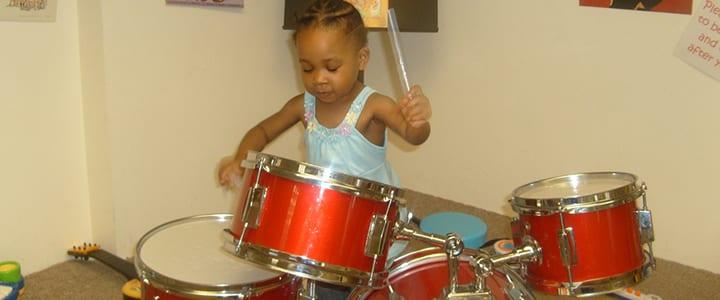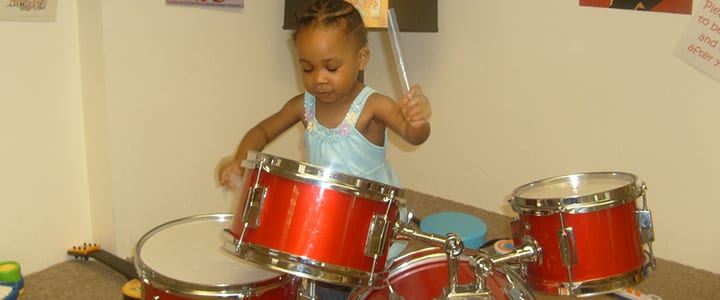As a parent, do you sometimes find it hard to motivate your son or daughter to practice drums? Don’t worry, you’re not alone. Next time your child is reluctant to practice, try these tips from music teacher Willy M...
As a parent, it can be difficult to see your child struggling with something – especially when it’s something they love. If your child is enrolled in drum lessons but is having trouble finding the motivation to practice at home, don’t despair!
Here are a few tips to help you encourage your child to pick up those sticks and get practicing.
How Do I Get My Child to Start Drumming?
Many parents find themselves wondering how to get their child to start drumming. While some kids take to the drums naturally, others may need a little more encouragement. Here are a few tips to help get your child started on the drums:
- Start by making sure your child is interested in playing the drums. If they show no interest, it will be difficult to get them to practice.
- Find a good drum teacher. A good drum teacher can make a big difference in whether or not your child sticks with playing. Choose someone who is patient and encouraging, and who can help your child progress at a comfortable pace.
- Get your child the right equipment. Make sure they have a good quality drum set that is sized properly for them. This will help them feel more comfortable while they are playing and make it easier for them to learn.
- Encourage practice. Help your child set up a regular practice schedule, and be sure to provide plenty of positive reinforcement when they stick to it.
With a little effort, you can help your child develop a lifelong love of playing the drums. Sign up for drumming lessons today, and check out the video below to get an idea of all the benefits associated with taking drumming lessons:
https://www.youtube.com/watch?v=_6R2QeM3fBA
How to Motivate Your Child to Practice Drums
Parents, listen up: don’t yell or pull out your hair. I know it can be frustrating to get your child to practice drums, but it’s not impossible.
If you’re reading this article, you probably have a son or daughter learning to play drums, and you’re wondering how to motivate your child to practice. If you notice that you constantly have to remind him or her, take some time to find out why he or she may not to practice. Below are some factors which may influence your child’s desire to practice drums. By paying attention to and changing some of these things, you may be able to motivate your child, and make drum practice more fun.
1. Practice Space
Does your child have a dedicated place to practice every day? This is important because drums require a lot of set up. If your son or daughter has to move their set around constantly in order to practice, then they’re less likely to want to play. Give them a set place to practice each day and they wont be discouraged about having to set up their equipment.
2. Necessary Materials
Does your son or daughter have everything he or she needs for practice? No one wants to play by themselves; does your child have a CD player, MP3 player, or computer to listen to music while they’re playing? This can make practicing easier, and make their practice time more enjoyable. Also, make sure your child has the right drum set and gear. For example, if they’re learning drum rolls, make sure they have a drum head or pad to use for practice. Make sure your child has the right equipment in order to succeed.
If your child doesn’t have a drum kit to practice on at home, you may want to consider investing in some practice pads for drumming. These can make a huge difference!
3. Practice Buddies
Does your child feel bored and lonely while practicing drums? Maybe he or she wants to play with friends rather than practicing? Encourage your child to invite one of his or her friends who play an instrument. Maybe tell them, “if you practice for 20 minutes Monday through Thursday, then on Friday your friends can come over for a jam session!” This is a great way to motivate even the most stubborn child to practice.
4. Find the Right Teacher
Is your son or daughter happy with his or her drum lessons? It’s important to make sure their teacher is encouraging and supports their individual learning style. Consider sitting in on a lesson to gauge your child’s level of enjoyment. The right teacher can help your child learn, and inspire him or her to want to improve.
5. Find Out What Kind of Music They Like
Chances are, if your child is studying drums, they have at least SOME interest in music. Talk to them about the kind of music they like and see if you can find some songs that they enjoy that also feature drums prominently. This way, they can learn while also listening to music they enjoy. You can even create a practice playlist for them on Spotify or another streaming service.
6. Make It a Family Affair
If your child sees that everyone in the family is getting involved in their drum practice, they’ll be more likely to want to do it too. Set up a makeshift practice space in the living room or basement, and have everyone take turns trying out the drums. You might be surprised at how quickly everyone catches on! And who knows – you might even discover a hidden talent or two.
7. Set Aside Dedicated Time for Drum Practice
One of the best ways to ensure that your child actually practices is to set aside a specific time each day for them to do so. Add it to the family calendar or create a daily schedule for them so they know exactly when it’s time to sit down and play. And don’t forget – consistency is key! If they miss a day here or there, that’s okay. Just make sure they get back on track as soon as possible.
What is a Good Age to Start Playing Drums?
There is no definitive answer when it comes to the best age to start playing drums. However, there are a few factors that can help you make the decision of whether or not now is the right time for you (or your child) to start playing.
One factor to consider is physical ability. Small children may not have the coordination or motor skills required to play drums effectively. On the other hand, elderly adults may find that their muscles are not as nimble as they used to be, making it difficult to play complex drum patterns. Generally speaking, people in their teens or twenties are going to have an easier time learning drums than those who are outside of this age range.
Another factor is commitment. Learning how to play drums takes time, patience, and practice. If you (or your child) are the type of person who is able to stick with something even when it gets tough, then learning drums may be a good fit. However, if you tend to give up easily or get bored quickly, it’s possible that drums may not be the right hobby for you.
The bottom line is that there is no wrong answer when it comes to starting to play drums. If you (or your child) are interested in learning, then go for it! The sooner you start, the sooner you’ll be rockin’ out like a pro.
What Do You Do When Your Child Doesn’t Want to Practice?
So, what do you do when your child doesn’t want to practice? Below are some more tips to help you motivate your child to keep making music!
1. Have a Conversation
Talk about why practice is important. Help your child understand that practice makes progress possible. The more they practice, the better they will get at playing their instrument. Point out how much they’ve already improved since they started taking lessons/playing their instrument, and how proud you are of their accomplishments.
2. Develop Goals
Set a practice goal together. Come up with a short-term goal that your child can reasonably achieve in a week or two with some focused effort. For example, if they’re working on a new piece, their goal might be to learn the first section by memory. Once they accomplish that goal, they can set a new one.
3. Have Fun With It
Make practice fun! Add variety to their daily routine by incorporating games, Sight-reading or ear-training exercises into their practice session. Anything that gets them interacting with their instrument in a different way will help break up the monotony and make practicing more enjoyable.
4. Keep It Light
Offer positive reinforcement. A little praise can go a long way! When your child finishes their practice session, take notice of their successes—even small ones—and let them know how proud you are of their hard work. You could also offer a small reward for completing their practice goal, like extra screen time or a favorite snack.
How Do You Motivate a Child to Practice an Instrument?
So how do you motivate a child to practice an instrument? It will take some legwork and patience to get your child to cooperate, but in most cases, a bit of persistence is all you need to be successful.
Hopefully these tips have taken some of the guesswork out of how to motivate your child to practice drums. When your child is learning drums, it’s important to be encouraging, and a great way to do this is to play along with them! Beating out a simple rhythm isn’t that hard, and you can play a hand drum or tambourine while your kid plays drums. It will not only help them become a better musician, but it will strengthen your relationship with your child.

Willy M. teaches guitar, ukulele, and mandolin lessons in Winston, NC. He has been playing drums since he was in high school and enjoys playing hand drums and percussion, as well as other ethnic drums. He is the author of the Dead Man’s Tuning series of mandolin songbooks, and is a former member of the American Federation of Musicians. Willy has been teaching for 20 years, and his students have ranged in age from young children to folks in their 80’s. Learn more about Willy.
Photo by Antoine Butler
Additional Photo by anapivirtua
Maile Proctor


